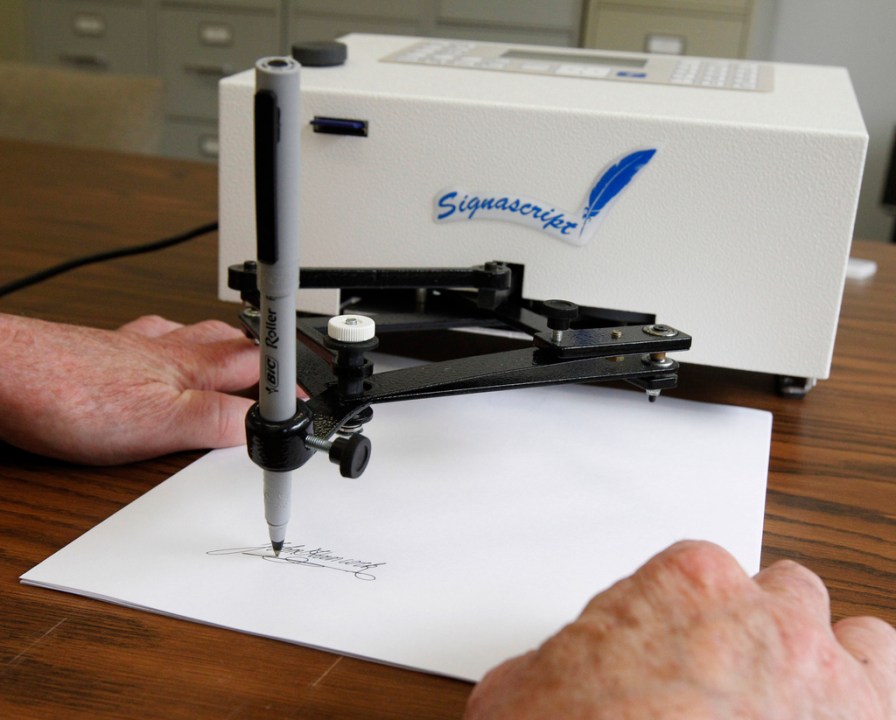

A White House Fact Sheet from June 4 says President Trump has signed a “Presidential Memorandum directing an investigation into who ran the United States while President Biden was in office.” Part of the investigation seeks information about “policy documents signed with an autopen.” The media have largely dismissed the issue. But with respect to the autopen Trump may be on to something.
The question is whether Joe Biden used an autopen to sign official documents, including presidential pardons, executive orders or perhaps even bills passed by Congress. If he did, was it just for convenience, or was someone (as the Fact Sheet puts it) authorizing the use of an autopen because of the president’s “serious cognitive decline?”
Some in the media want to dismiss the concern. An Associated Press headline reads, “Presidents have used autopens for decades. Now Trump objects to Biden’s use of one.” Get it? Nothing to see here, folks. Autopens are a longstanding presidential tool.
But even if presidents have used them, not all presidential signings are equal.
The first question is whether it’s legal and, if so, appropriate for a president to use an autopen on official documents? Does the U.S. Constitution address the issue? Indeed, it does.
Article 1, Section 7, says: “Every Bill which shall have passed the House of Representatives and the Senate, shall, before it become a Law, be presented to the President of the United States; If he approve he shall sign it, but if not he shall return it, with his Objections to that House in which it shall have originated …”
That seems pretty clear. Bills passed by Congress must be signed by the president.
Or maybe not. A July 7, 2005, opinion from Deputy Assistant Attorney General Howard C. Nielson, Jr., of the Justice Department’s Office of Legal Counsel concluded the president doesn’t need to “personally perform the physical act of affixing his signature to a bill.” Rather, he may “sign a bill within the meaning of Article I, Section 7 by directing a subordinate to affix the President’s signature to such a bill, for example by autopen.”
Nielson’s conclusion was based on his assertion that at the writing of the Constitution there was a “well-settled legal understanding, [that] an individual could sign a document by directing that his signature be affixed to it by another.”
While this memo came during President George W. Bush’s presidency, Bush never took this step. However, President Barack Obama did, in 2011, when he was out of the country. The White House cited the 2005 memo as justification. With that act, Obama became the first president to use an autopen to sign a bill.
In response to Obama’s use of the autopen, a 2012 analysis by Terry L. Turnipseed in the “Journal of Technology Law and Policy” concluded the Constitution does require a president to personally sign a duly passed bill. However, the author then went on an extended discussion about the history of wills and concluded that a president could have someone in his presence sign the legislation for him.
Of course, presidents have used autopens to sign all types of documents: letters, invitations, pictures, etc. And no one is challenging that use.
Unlike ceremonial uses for an autopen, a bill has the force of law. And the fact that no president had used an autopen to sign a bill until 2011 implies that presidents believed they should personally sign legislation. In fact, important bills were sent to traveling presidents, even overseas, so they could personally sign them.
But what about presidential pardons? They aren’t ceremonial. And in a sense, they also have the force of law for those pardoned. If the Constitution requires a bill to be personally signed, should that include pardons?
And how about executive orders? Fox News reports that a pro-energy group is demanding an “investigation into over half a dozen Biden administration executive actions related to climate that it believes should be deemed null and void due to them being signed by an autopen.”
For his part, Biden has responded to these allegations saying, “I made the decisions about the pardons, executive orders, legislation, and proclamations.” Notice Biden didn’t say he signed them, just that he made the decisions. And we can’t even be sure of that since he has denied making certain decisions that had already appeared with his signature.
Fortunately, Rep. James Comer (R-Ky.), chairman of the House Committee on Oversight and Government Reform, is opening an investigation into Biden’s use of an autopen. Once the public has a sense of when and how it was used, if it was used, we may see lawsuits challenging some of Biden’s actions.
It’s anybody’s guess how this will turn out if it makes its way to the Supreme Court. But originalist justices tend to go with the Constitution’s actual wording. If we find out that Biden used an autopen frequently for pardons, executive orders and even bills, and the Supremes rule these null and void, that will be one more stain on the Biden legacy and one more plus for Trump’s efforts to expose past wrongs.
Merrill Matthews is a public policy and political analyst and the co-author of “On the Edge: America Faces the Entitlements Cliff.”






